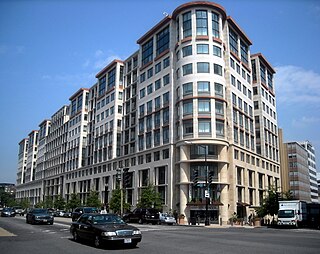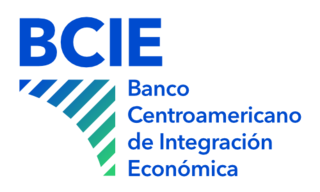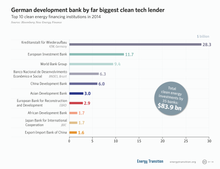The International Bank for Reconstruction and Development (IBRD) is an international financial institution, established in 1944 and headquartered in Washington, D.C., United States; it is the lending arm of World Bank Group. The IBRD offers loans to middle-income developing countries. It is the first of five member institutions that compose the World Bank Group. The initial mission of the IBRD in 1944, was to finance the reconstruction of European nations devastated by World War II. The IBRD and its concessional lending arm, the International Development Association (IDA), are collectively known as the World Bank as they share the same leadership and staff.

The International Finance Corporation (IFC) is an international financial institution that offers investment, advisory, and asset-management services to encourage private-sector development in less developed countries. The IFC is a member of the World Bank Group and is headquartered in Washington, D.C. in the United States.

The European Bank for Reconstruction and Development is an international financial institution founded in 1991. As a multilateral developmental investment bank, the EBRD uses investment as a tool to build market economies.

The Overseas Private Investment Corporation (OPIC) was the United States Government's Development finance institution until it merged with the Development Credit Authority (DCA) of the United States Agency for International Development (USAID) to form the U.S. International Development Finance Corporation (DFC). OPIC mobilized private capital to help solve critical development challenges and in doing so, advanced the foreign policy of the United States and national security objectives.

The Inter-American Development Bank is an international financial institution headquartered in Washington, D.C., United States of America, and serving as the largest source of development financing for Latin America and the Caribbean. Established in 1959, the IDB supports Latin American and Caribbean economic development, social development and regional integration by lending to governments and government agencies, including State corporations.

An export credit agency or investment insurance agency is a private or quasi-governmental institution that acts as an intermediary between national governments and exporters to issue export insurance solutions and guarantees for financing. The financing can take the form of credits or credit insurance and guarantees or both, depending on the mandate the ECA has been given by its government. ECAs can also offer credit or cover on their own account. This does not differ from normal banking activities. Some agencies are government-sponsored, others private, and others a combination of the two.

The Central American Bank for Economic Integration - CABEI was founded in 1960. It is an international multilateral development financial institution. Its resources are invested in projects that foster development to reduce poverty and inequality; strengthen regional integration and the competitive insertion of its member countries in the global economy; providing special attention to environmental sustainability. Its headquarters are in Tegucigalpa (Honduras) and has regional offices in Guatemala, Honduras, El Salvador, Nicaragua, Costa Rica and Panama.
The IDBI Bank Limited is a development finance institution under the ownership of Life Insurance Corporation of India and Government of India. It was established in 1964 as Industrial Development Bank of India, a development finance institution, which provided financial services to industrial sector. In 2005, the institution was merged with its commercial division, IDBI Bank, forming the present-day banking entity and was categorised as "other development finance institution" category. Later in March 2019, Government of India asked Life Insurance Corporation to infuse capital in the bank due to high NPA and capital adequacy issues and also asked LIC to manage the bank to meet the regulatory norms. IDBI was put under Prompt corrective action of the RBI and on 10 March 2021 IDBI came out of the PCA. At present direct and indirect shareholding of Government of India in IDBI Bank is approximately 95%, which Government of India (GoI) vide its communication F.No. 8/2/2019-BO-II dated December 17, 2019, has clarified and directed all Central/State Government departments to consider IDBI Bank for allocation of Government Business. Many national institutes find their roots in IDBI like SIDBI, EXIM, National Stock Exchange of India, SEBI, National Securities Depository Limited.
An international financial institution (IFI) is a financial institution that has been established by more than one country, and hence is subject to international law. Its owners or shareholders are generally national governments, although other international institutions and other organizations occasionally figure as shareholders. The most prominent IFIs are creations of multiple nations, although some bilateral financial institutions exist and are technically IFIs. The best known IFIs were established after World War II to assist in the reconstruction of Europe and provide mechanisms for international cooperation in managing the global financial system.

The National Bank for Agriculture and Rural Development (NABARD) is an All India Financial Institution (AIFI) and an apex Regulatory Body for overall supervision of Regional Rural Banks, State Cooperative Banks and District Central Cooperative Banks in India. It was established under the NABARD Act 1981 passed by the Parliament of India. It is fully owned by the Department of Financial Services (DFS) under the Ministry of Finance.

The Ministry of Finance is a ministry within the Government of India concerned with the economy of India, serving as the Treasury of India. In particular, it concerns itself with taxation, financial legislation, financial institutions, capital markets, centre and state finances, and the Union Budget.

FMO is a Dutch development bank structured as a bilateral private-sector international financial institution based in the Hague, the Netherlands. FMO manages funds for the Ministries of Foreign Affairs and Economic Affairs of the Dutch government to maximize the development impact of private sector investments. It is licensed as a bank and supervised by the Dutch Central Bank.
Vijay Mahajan is the chief executive officer (CEO) of the Rajiv Gandhi Foundation and the director of the Rajiv Gandhi Institute of Contemporary Studies.
Bangladesh is a developing country with an impoverished banking system, particularly in terms of the services and customer care provided by the government run banks. In recent times, private banks are trying to imitate the banking structure of the more developed countries, but this attempt is often foiled by inexpert or politically motivated government policies executed by the central bank of Bangladesh, Bangladesh Bank. The outcome is a banking system fostering corruption and illegal monetary activities/laundering etc. by the politically powerful and criminals, while at the same time making the attainment of services or the performance of international transactions difficult for the ordinary citizens, students studying abroad or through distance learning, general customers etc.
Banking in Bhutan, a small country in East Asia, is an industry that has grown slowly as the country has pursued modernization. The country has a vibrant informal culture of finance which only weakly integrates formal financial services.

The Eurasian Development Bank (EDB) is an international development finance institution investing in the development of the economies, trade and other economic ties, and integration in Eurasian countries. The EDB was founded in 2006 and is headquartered in Almaty, Kazakhstan. The Bank has a branch in St. Petersburg and representative offices in Astana, Bishkek, Dushanbe, Yerevan, Minsk, and Moscow.
All India Financial Institutions (AIFI) is a group composed of financial regulatory bodies that play a pivotal role in the financial markets. Also known as "financial instruments", the financial institutions assist in the proper allocation of resources, sourcing from businesses that have a surplus and distributing to others who have deficits - this also assists with ensuring the continued circulation of money in the economy. Possibly of greatest significance, the financial institutions act as an intermediary between borrowers and final lenders, providing safety and liquidity. This process subsequently ensures earnings on the investments and savings involved. In Post-Independence India, people were encouraged to increase savings, a tactic intended to provide funds for investment by the Indian government. However, there was a huge gap between the supply of savings and demand for the investment opportunities in the country.

TIB Development Bank, formerly known as Tanzania Investment Bank (TIB), is a government-owned development bank in Tanzania. The bank is the first development finance institution established by the Government of Tanzania. The activities of TIB are supervised by the Bank of Tanzania, the central bank and national banking regulator. TIB is registered as a Registered Financial Institution.

Climate finance is an umbrella term for loans, investments, and other forms of financial capital allocation in the area of climate change mitigation, adaptation and/or resiliency.
Dr. Sailendra Narain is a development finance specialist born in Nawadah, Bihar Province, India. For over 40 years, Narain has been a pioneer in developing the global SME sector. His specialities include: designing policy frameworks for SME Growth, establishing SME financing programs in banking and development financial institutions, and capacity building for SMEs with a focus on Entrepreneurship.












